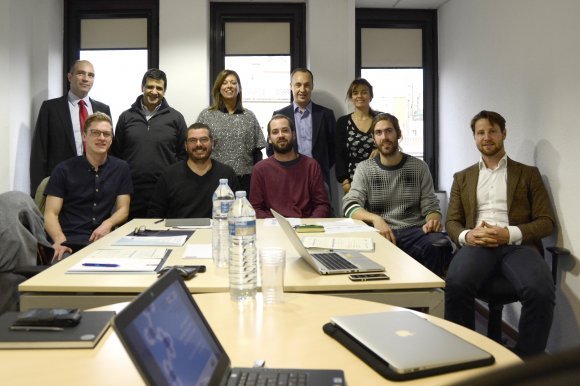Business men and politicians from Flanders show an interest in EADA training for social bodies
Last November a delegation from the Company and Social Economy Department of the Flemish government visited EADA. The aim of their visit was to familiarise themselves with the development and running of the Training Programme for Managers of Social Economy Companies and Cooperatives offered by EADA as part of the ARACOOP programme, an initiative organised through the Cooperatives Confederation of Catalunya and promoted by the Company and Labour Department of the Generalitat de Catalunya.
Over 80 public and private bodies and institutions have collaborated on this programme, involved in the creation and growth of social economy companies and cooperatives. All of them share the same objectives: to reinforce their positioning, to further the growth of more organisations of this type and to promote public-private collaborations.
The EADA training programme for managers of social companies and cooperatives took an in depth look at aspects such as strategic vision and the business model, lateral and collaborative leadership, as well as effective communication. It also drew up an action plan for putting the concepts dealt with on the programme into action.

The Flemish delegation that visited EADA in order to be briefed on the development of the Training Programme for Managers of Social Economy Companies and Cooperatives.
Attracted by the collaborative formula
According to Pau Roig, director of the EADA Corporate area, “the representatives of the Flemish administration praised the joint framework of administration-company-business school collaboration for a strategic sector with a future ahead of it which at the same time constitutes a dynamic force for the region”. In order to address this challenge, “the members of the Flemish delegation regarded training in management skills as a fundamental cornerstone not only for professionalising the sector but also for aspiring to excellence and being able to compete in a global environment”, Roig added.
For this reason they also showed an interest in the training EADA has provided for some years now to different institutions and bodies that promote social initiatives. For example the programmes on management skills for Special Job Centres and Work Inclusion Companies (linked to the Company and Labour Department of the Generalitat de Catalunya) or the sessions for furthering innovation and social entrepreneurship that were organised in conjunction with Barcelona Activa, via the “Management of Companies for Social Entrepreneurship Initiatives” programme, and the Intrapreneurship programme run in conjunction with DINCAT, an association made up of 300 non profit organisations that employ and provide services for people with intellectual disability.
In this respect, Pau Roig is proud of the fact that “EADA is a flagship in its contribution to the social economy sector because ethics, the culture of collaborative effort and corporate transparency are values that have formed part of our business school’s DNA ever since it was first set up”.
